Contents
Content Type: 1
Title: Fascinating Video about Interpreting
Body:
Here is a fascinating 9-minute video about the work of professional interpreters in bilateral meetings, including different formats and some of the challenging guidelines and situations for interpreters: https://youtu.be/twCpijr_GeQ
Source: YouTube
Inputdate: 2019-07-07 11:23:39
Lastmodifieddate: 2019-07-08 04:22:51
Expdate:
Publishdate: 2019-07-08 02:15:01
Displaydate: 2019-07-08 00:00:00
Active: 1
Emailed: 1
Isarchived: 0
Content Type: 1
Title: Article: Bringing Global Education to Rural Communities
Body:
Ryan Hauck describes the World Affairs Council of Seattle's Global Classroom Program, which was designed to "address possible global education gaps across diverse communities" in Washington. Read his article at http://blogs.edweek.org/edweek/global_learning/2019/07/bringing_global_education_to_rural_communities.html
Source: Education Week
Inputdate: 2019-07-07 11:24:14
Lastmodifieddate: 2019-07-08 04:22:51
Expdate:
Publishdate: 2019-07-08 02:15:01
Displaydate: 2019-07-08 00:00:00
Active: 1
Emailed: 1
Isarchived: 0
Content Type: 1
Title: Article: Identity, Storytelling, and Culturally Responsive Teaching
Body:
Portland, Oregon Spanish teacher Michelle Nicola talks about how she uses Afro-Mexican stories that she collected during a Fulbright research project in Veracruz, Mexico, in her Spanish classes to "challenge dominant narratives about diverse populations and invite students to think beyond heroes and holidays." Read her article to learn about Black Mascogo, Seminole, and Kickapoo people who re-settled in El Nacimiento, Mexico, and how Nicola is using these stories in her Spanish classes: http://blogs.edweek.org/edweek/global_learning/2019/06/identity_storytelling_and_culturally_responsive_teaching.html
Source: Education Week
Inputdate: 2019-07-07 11:24:47
Lastmodifieddate: 2019-07-08 04:22:51
Expdate:
Publishdate: 2019-07-08 02:15:01
Displaydate: 2019-07-08 00:00:00
Active: 1
Emailed: 1
Isarchived: 0
Content Type: 5
Title: Playing to Learn
Body:
The Center for Applied Second Language Studies (CASLS) values teachers and is committed to working alongside them to improve education.
As an outgrowth of this commitment, CASLS Assistant Director Stephanie Knight was on hand to serve as curriculum specialist at Central America: People and the Environment (https://as.vanderbilt.edu//clas/summerinstitute2019/), a workshop hosted by the Vanderbilt Center for Latin American Studies (VCLAS) at the end of June. Throughout the four-day workshop, teachers experienced playful learning, explored research related to play and its relationship to meaningful cognitive and social engagement, and built their own prototypes to facilitate the use of play in their classrooms. Colleen McCoy, VCLAS Outreach Coordinator, commented, “[CASLS'] research-based approach to the pedagogy of play provided the group with new classroom ideas across all disciplines. They loved it!”
CASLS would like to extend our thanks to the wonderful participants at the workshop and the team at VCLAS for such meaningful collaboration.
Source: CASLS Spotlight
Inputdate: 2019-07-07 11:26:55
Lastmodifieddate: 2019-07-08 04:22:51
Expdate:
Publishdate: 2019-07-08 02:15:01
Displaydate: 2019-07-08 00:00:00
Active: 1
Emailed: 1
Isarchived: 0
Content Type: 5
Title: Catalyst: Reflective Learning for Educators
Body:
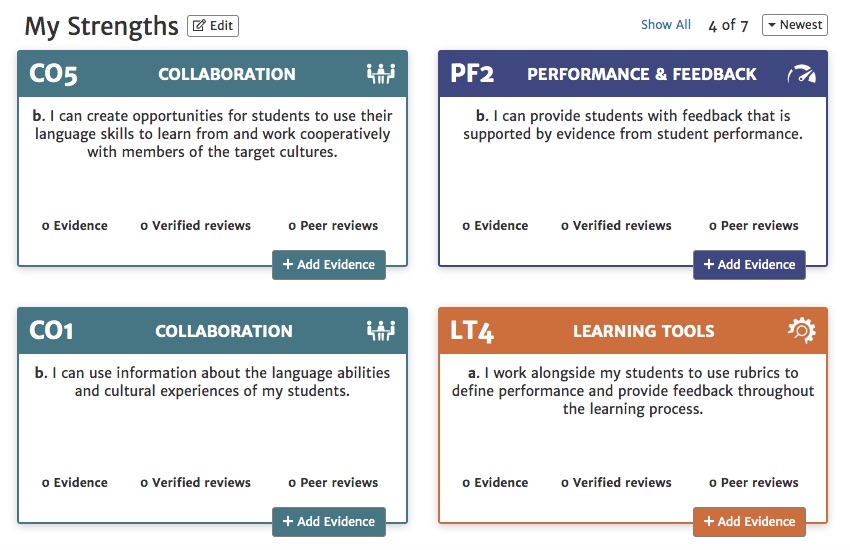 We at CASLS have been supporting reflective learning and providing e-portfolios for students since 2008. But reflective learning isn’t just for students; we as educators can benefit, too.
We at CASLS have been supporting reflective learning and providing e-portfolios for students since 2008. But reflective learning isn’t just for students; we as educators can benefit, too.
Catalyst allows world language educators to:
- set professional goals
- identify their strengths
- upload evidence and reflections that document their ongoing growth.
Learning happens most effectively within communities. With Catalyst, educators of all levels can connect with others to engage in meaningful collaboration and receive feedback on teaching practices. Workshop facilitators, department heads, and other professional mentors can encourage and support professional growth toward shared goals. Synchronous mentoring allows for real-time feedback.
Educators can use Catalyst at no charge.
Catalyst is based on the Teacher Effectiveness in Language Learning (TELL) framework and developed collaboratively by the Center for Applied Second Language Studies (CASLS) and Professionals in Education Advancing Research and Language Learning (PEARLL).
Source: CASLS Spotlight
Inputdate: 2019-07-10 08:40:03
Lastmodifieddate: 2019-07-22 04:30:16
Expdate:
Publishdate: 2019-07-22 02:15:01
Displaydate: 2019-07-22 00:00:00
Active: 1
Emailed: 1
Isarchived: 0
Content Type: 4
Title: Un-telling a Story
Body:
This week's Activity of the Week is designed to accompany the Topic of the Week, in which Mandy Gettler reflects on the differences in how people perceive their situations and work. Using this reflection template, you'll think of a situation and describe it from two perspectives, then make a plan to do some fact-checking.
Source: CASLS Activity of the Week
Inputdate: 2019-07-10 08:56:15
Lastmodifieddate: 2019-07-29 04:30:56
Expdate:
Publishdate: 2019-07-29 02:15:01
Displaydate: 2019-07-29 00:00:00
Active: 1
Emailed: 1
Isarchived: 0
Content Type: 3
Title: A Detrimental Commitment to Our Expectations
Body:
By Mandy Gettler, CASLS Associate Director
This Topic of the Week is part of our July series on self-care. It expands upon Disposition 1: Suspend Judgment.
We all know Mark: the chronically late coworker. Late to work, late to meetings, late to finish a project. My Mark was even worse. He wasn’t just late all the time, he also communicated poorly about these things. Would Mark send me his piece of a project on time? Would it be a day late? A week late? I had absolutely no idea. Even if I had asked, Mark himself never knew.
I labeled Mark as someone who was undependable, despite the high quality of his work when he did turn it in.
I finally scheduled a time to talk with Mark. I closed the door to my office and began, “Mark, your work is amazing and incredibly high quality. When you do it. I can’t depend on you to do actually do any work.”
I hadn’t gotten to my real question – what are we going to do about your lack of dependability? – when he burst into tears.
I had been committed to telling a story about Mark – that he was undependable – when really Mark's story was quite different.
I hadn’t stopped to consider that perhaps I was filling in gaps about Mark's behavior inappropriately. I was quick to assess and judge the situation – and then to try and fix it – when both Mark and I would have been better served had I instead approached the gaps in my knowledge about Mark with curiosity rather than judgement.
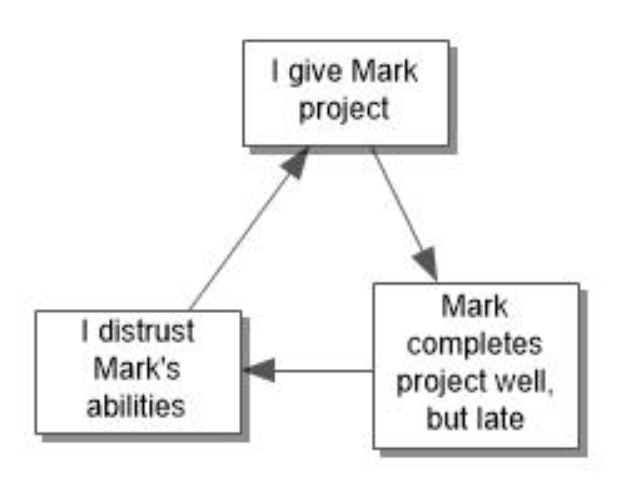
Figure 1. My Story About Mark
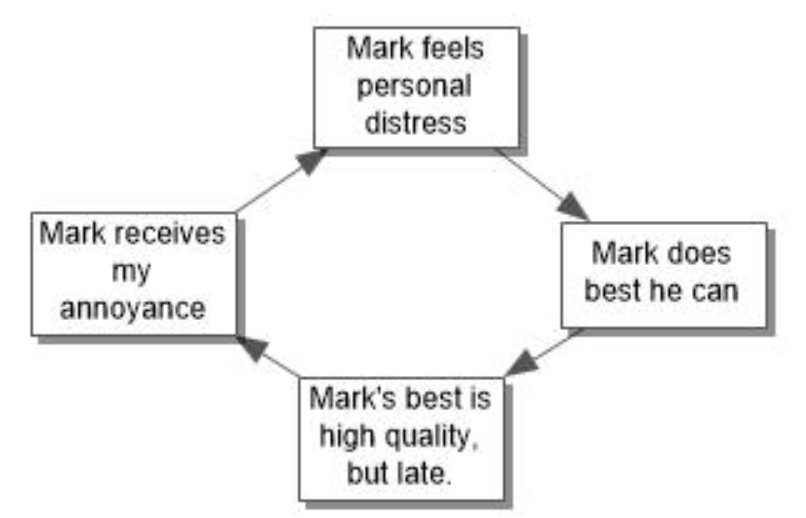
Figure 2. Mark's Story about Himself
Our expectations about people and events shape how that event unfolds, how we think about it, and how we feel about it. I told myself that Mark was undependable and so I wedged everything he did into that narrative frame. When the narrative frame changed – Mark needed help, he wasn’t undependable – I could act more appropriately.
Our brain’s ability to have expectations and wait for them to be fulfilled seems absolutely logical and necessary. And probably lifesaving. We can expect that a rattlesnake will bite us; we need not wait for that happen. We can expect that the singing frogs in the morning signal the start of spring; we best get ready to find the first growing edibles.
My life does not have rattlesnakes (thankfully), and while I enjoy foraging for urban edibles (dandelion pesto, anyone?), I don’t need to in order to survive. Living in a modern, urban world, being quick to assess and judge a situation typically works to my detriment.
The ability to suspend our judgment about a person or an event, and even about our own thoughts and feelings, allows us the space for reality to unfold. We become less reactive and more intentional. We allow the world – and our place in it – to be as it is. This is the space where liberation happens. This is where holiness happens.
This week’s Activity of the Week helps us explore how to suspend judgment and approach our lives with curiosity. Because we – and the Marks of the world – deserve it.
Source: CASLS Topic of the Week
Inputdate: 2019-07-10 08:59:32
Lastmodifieddate: 2019-07-29 04:30:56
Expdate:
Publishdate: 2019-07-29 02:15:01
Displaydate: 2019-07-29 00:00:00
Active: 1
Emailed: 1
Isarchived: 0
Content Type: 5
Title: CASLS Welcomes Intern Leo Shiner
Body:
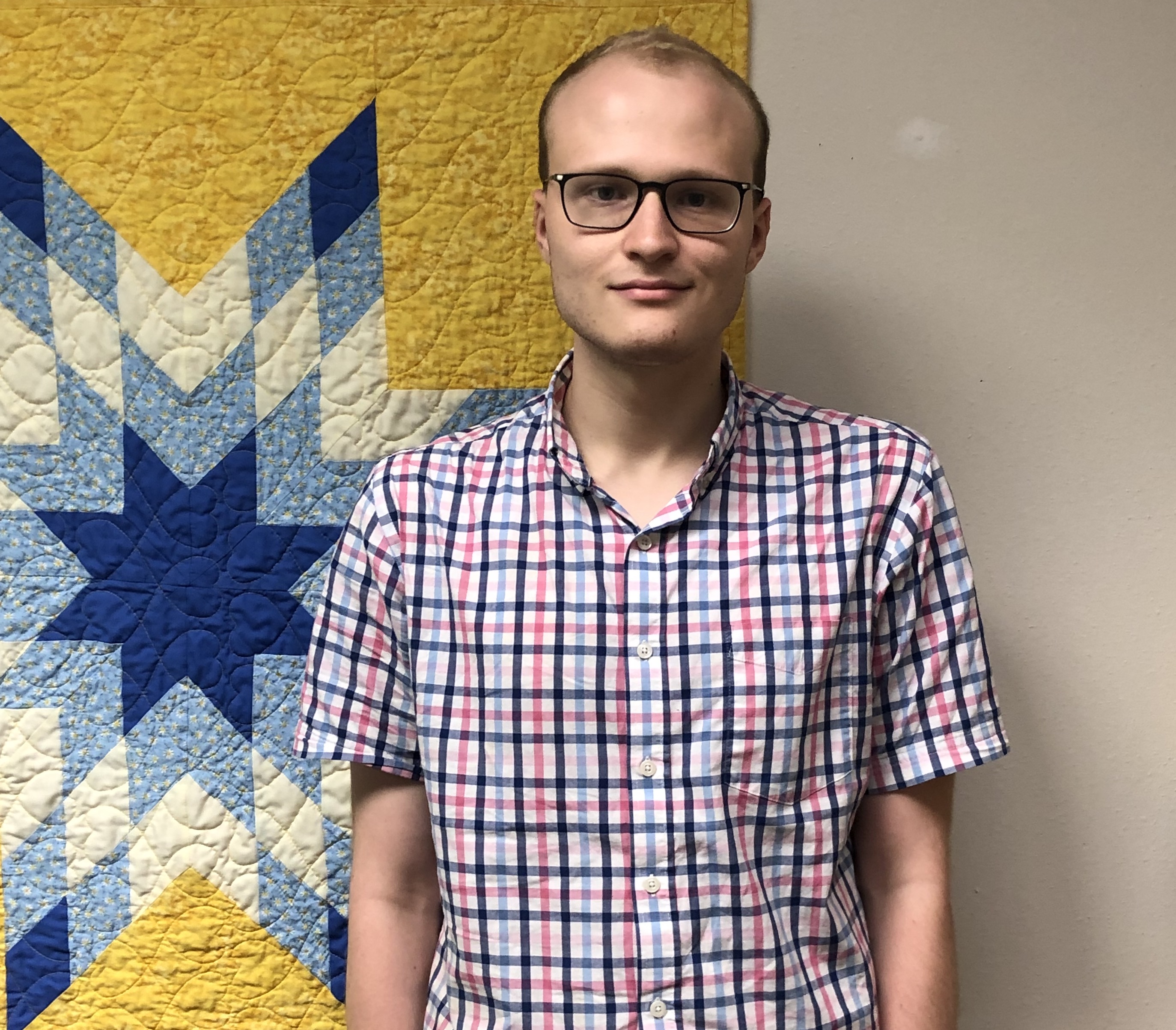 We at CASLS are delighted to have a special intern with us this summer. Leo Shiner, a rising senior at Brown University majoring in linguistics and Slavic studies, is here at CASLS to help with projects including intercultural communicative assessment and the use of games for language learning. Leo’s research interests center around applied linguistics, especially language education with digital-medium courses. In his quest for researched-based, effective language learning approaches, Leo’s guiding question is “What would I find helpful or engaging in a language course?” Leo is especially interested in Uralic languages, especially Permic languages like Udmurt, Komi-Zyryan, and Komi-Permyak. In this coming fall he’ll be studying abroad in Yaroslavl, Russia.
We at CASLS are delighted to have a special intern with us this summer. Leo Shiner, a rising senior at Brown University majoring in linguistics and Slavic studies, is here at CASLS to help with projects including intercultural communicative assessment and the use of games for language learning. Leo’s research interests center around applied linguistics, especially language education with digital-medium courses. In his quest for researched-based, effective language learning approaches, Leo’s guiding question is “What would I find helpful or engaging in a language course?” Leo is especially interested in Uralic languages, especially Permic languages like Udmurt, Komi-Zyryan, and Komi-Permyak. In this coming fall he’ll be studying abroad in Yaroslavl, Russia.
Leo finds that his research interests intersect with other interests and hobbies, including playing video games (especially Fire Emblem, a strategy role-playing game) and the artwork of Udmurt artist Aleksandra Yurievna Gladysh AKA Autumn Sacura. We’re grateful to have Leo here with us this summer and wish him a warm welcome to CASLS and to Eugene!
Source: CASLS Spotlight
Inputdate: 2019-07-11 14:53:07
Lastmodifieddate: 2019-07-15 04:24:57
Expdate:
Publishdate: 2019-07-15 02:15:01
Displaydate: 2019-07-15 00:00:00
Active: 1
Emailed: 1
Isarchived: 0
Content Type: 5
Title: Games2Teach Collaboratory
Body:
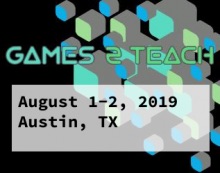 The Center for Applied Second Language Studies (CASLS) is committed to meaningful collaboration and creation with educators. As an outgrowth of this commitment, CASLS is excited for its upcoming collaboration with the Center for Open Educational Resources and Language Learning (COERLL) at the University of Texas at Austin. This collaboration, Game2Teach Collaboratory, is a two-day workshop in which language teachers experience collaborative, game-oriented play and learn to implement games in their classrooms.
The Center for Applied Second Language Studies (CASLS) is committed to meaningful collaboration and creation with educators. As an outgrowth of this commitment, CASLS is excited for its upcoming collaboration with the Center for Open Educational Resources and Language Learning (COERLL) at the University of Texas at Austin. This collaboration, Game2Teach Collaboratory, is a two-day workshop in which language teachers experience collaborative, game-oriented play and learn to implement games in their classrooms.
Thank you to our colleagues at COERLL for their collaboration and organization of the event, and thank you to all of the participants. We can’t wait for Austin!
Information about the workshop is located here.
Source: CASLS Spotlight
Inputdate: 2019-07-11 16:09:46
Lastmodifieddate: 2019-07-29 04:30:56
Expdate:
Publishdate: 2019-07-29 02:15:01
Displaydate: 2019-07-29 00:00:00
Active: 1
Emailed: 1
Isarchived: 0
Content Type: 4
Title: Journaling Prompts Dealing with Intention
Body:
This week’s Activity of the Week presents an opportunity to attune to your own experience and consider how intention arises, becomes articulate, and is manifest in healthy community. If you’re not in a consistent journaling practice, consider setting a timer to help structure your experience. If you journal often, consider spreading the prompts out over a series of journaling sessions.
The journal prompts are available here. Feel free to pick and choose or work your way through the extensive set of prompts.
Source: CASLS Activity of the Week
Inputdate: 2019-07-12 15:26:29
Lastmodifieddate: 2019-07-15 04:24:57
Expdate:
Publishdate: 2019-07-15 02:15:01
Displaydate: 2019-07-15 00:00:00
Active: 1
Emailed: 1
Isarchived: 0
